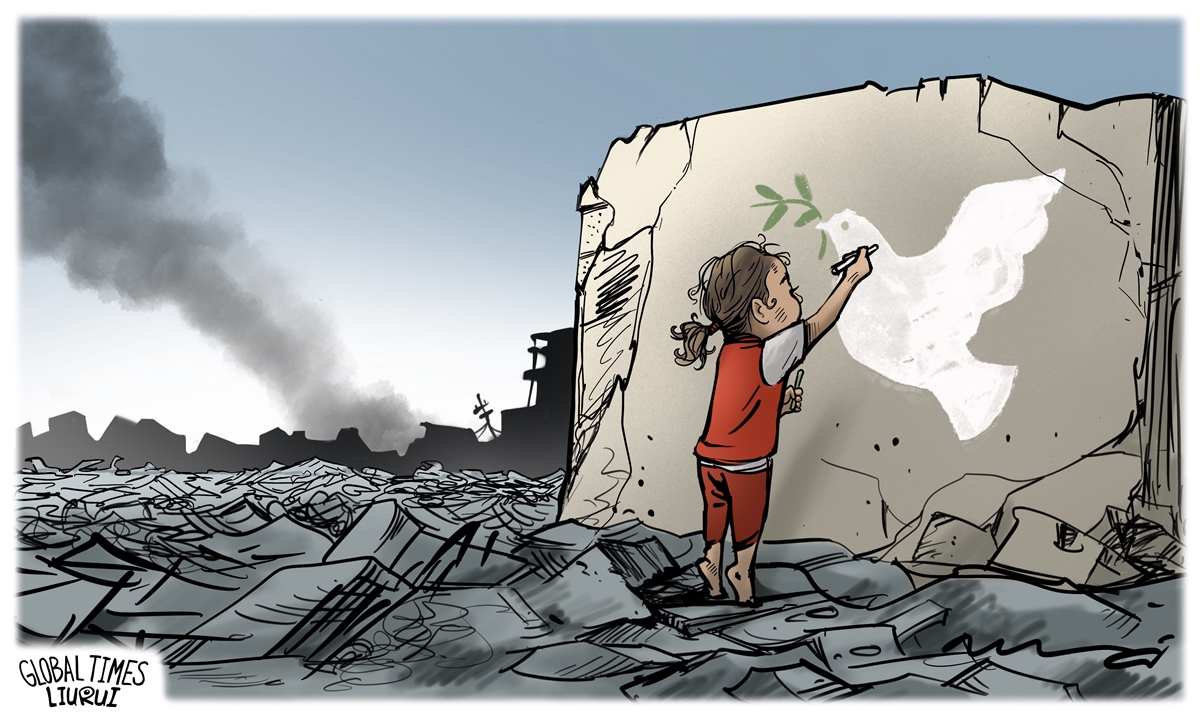
Longing for peace.Illustration: Liu Rui/Global Times
Faced with the worsening humanitarian disaster in the Middle East, growing domestic opposition and the pressure of the international community, the US, which stood firmly on Israel's side at the beginning of this round of the Gaza conflict, has shown signs of turning its difference with Israel in the Palestine-Israel conflict into concrete action of pressuring Israel. However, Washington's general policy of taking sides with Israel is expected to stay, leading to bleak prospects for peace in Gaza.
US media Axios reported on Sunday that Washington last week put a hold on a shipment of US-made ammunition to Israel, citing two Israeli official sources. It is the first time since this round of Palestine-Israel conflict that the US has stopped a weapons shipment intended for the Israeli military, said the US media outlet.
As of press time, the reason for such a pause is not yet known, and there has been no response from any US authority or official. Experts told the Global Times that if the move is a political decision made by Washington, it is clearly a manifestation of the Biden administration's further pressure on Israel, with a major goal to garner domestic public support in the approaching elections, including winning back the hearts of Muslim voters.
As the Gaza conflict continues to drag on, the US is now caught in an increasingly thorny dilemma. At the international level, as Israel's ally and largest military supporter, Washington's continued favor toward Israel shown in the current conflict has seriously affected the US' international image. Meanwhile, more and more Americans are showing dissatisfaction with Washington's staunch support for Israel, leading to protests and even clashes.
Such a dilemma, in a great portion, originated from Israel's unwillingness to accept US' proposals over the Gaza conflict. Li Weijian, a research fellow with the Institute for Foreign Policy Studies of the Shanghai Institutes for International Studies, believes there will be more measures from the US to exert pressure on Israel if Israel continues to ignore the pressuring signals from the US.
Li said that as the US strives to woo Arab countries for its own interests in the Middle East, the "special relationship" between the US and Israel may see signs of slight tottering, and Washington could hesitate about giving Israel unconditional support like it used to.
Nevertheless, Washington will not give up its decades-old practice of supporting Israel. Niu Xinchun, executive director of the China-Arab Research Institute of Ningxia University, told the Global Times that the current US-Israel differences are at the tactical level - the US opposes Israel's decision to launch a full-scale ground invasion of Rafah that would have caused an even greater humanitarian crisis. While at the strategic level, the two countries maintain a high degree of consistency, as they both seek the complete elimination of Hamas and the rescue of all hostages, noted Niu.
On the other hand, support for Israel coming from the US political sphere, be it from Congress or the White House, is still solid. Last month, Biden signed a foreign aid bill that included $26 billion for the Gaza conflict, including $15 billion in military aid to Israel. Experts say the halt of US-made ammunition shipment is merely likely to be an isolated incident, and it is unlikely that the US will stop its military assistance to Israel.
What is hypocritical is that the US is doing all this while posturing itself as a mediator working to prevent the escalation of the situation in the Middle East. Its efforts are questioned by the global community as the country chooses to stand in favor of Israel at the United Nations Security Council instead of putting substantial pressure on Israel. Washington's provision of military assistance and political "protection" to Israel has made the cease-fire far from becoming a reality, bringing the road to peace in the Gaza Strip to an impasse.



